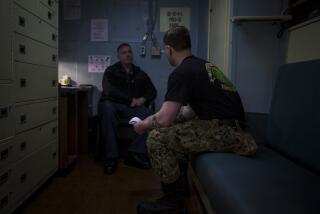U.S. Plans Mental Ward for Detainees
- Share via
GUANTANAMO BAY NAVAL BASE, Cuba — The U.S. military is opening a ward for terrorism suspects with mental problems at Guantanamo Bay following a rash of suicide attempts by detainees, including one that left a man with serious brain damage.
The mission commander, Army Maj. Gen. Geoffrey Miller, said he has recommended that some detainees be freed, but he would not say how many.
“The decision on transferring these enemy combatants back to their home countries will be made by the highest levels of our government,” Miller said Thursday. “They may be there for weeks or months.”
The psychiatric wing of about 35 cells will open this month with a staff of psychiatrists, psychologists and nurses, Miller said.
Miller denied the unit is being opened solely in response to the suicide attempts, saying it is part of planned improvements in health care.
Sixteen prisoners have made 20 attempts to kill themselves at the U.S. base in eastern Cuba, most using sheets or pieces of clothing to try to hang themselves.
One man suffered brain damage after a Jan. 16 attempt and remains in the base hospital, said Navy Capt. Albert Shimkus, the chief medical officer.
“He’s lost his ability to function,” Shimkus said. “We don’t anticipate that he’s going to get any better than he is.”
The man, whose nationality has not been revealed, is the first detainee to suffer serious injury at the prison, where 650 men from 43 countries are being held on suspicion of links to the Al Qaeda terrorist network or Afghanistan’s fallen Taliban regime.
Another detainee who has tried to kill himself three times is being closely monitored, and guards have received training to watch for suicide attempts, officials said.
To ready the new ward, workers are remodeling a standard block of 8-by-7-foot cells. Patients will be held in similarly sized individual cells, but some cells will be twice as large to allow treatment and counseling, and some prisoners will be shackled, officials said.
About 70 prisoners already are receiving mental health treatment, many through counseling and some through drugs, Miller said.
Amnesty International has urged U.S. authorities to investigate whether interrogation methods are contributing to suicide attempts. American officials insist the questioning is humane.
More to Read
Sign up for Essential California
The most important California stories and recommendations in your inbox every morning.
You may occasionally receive promotional content from the Los Angeles Times.













